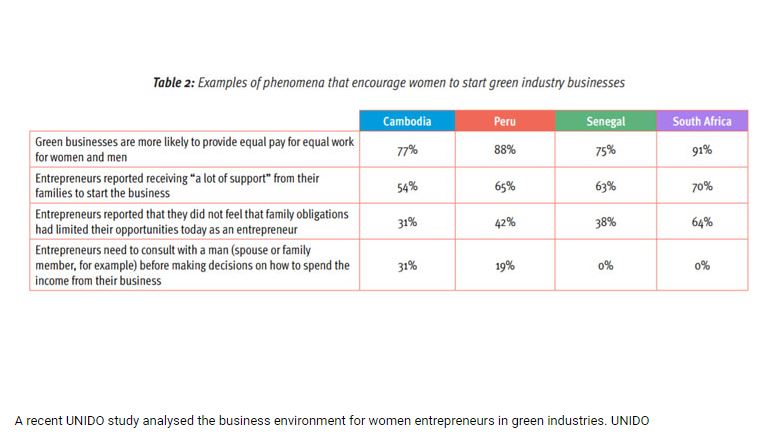Cambodia: Policy shifts needed to empower female entrepreneurship: UNIDO
The green industry could become the catalyst needed to empower female entrepreneurship, but much work needs to be done on a societal and policy level in Cambodia if these benefits are to be realised.
That’s according to a recent study published by the United Nations Industrial Development Organization (UNIDO.)
The study analysed government policies and conducted interviews and surveys with women entrepreneurs to offer a snapshot of the environment for female business leaders in Cambodia, Peru, Senegal and South Africa.
In Cambodia, it found that while the situation on the whole is improving, government policy is inadequate in addressing gender inequality in multiple sectors, including the green industry, which is loosely defined in Cambodia and includes the garment, agribusiness, energy and tourism sectors.
“Amongst the policies reviewed, there is currently a lack of focus on women’s empowerment in green industries,” the report said.
Out of the 10 government policies reviewed, including the Gender and Climate Action Plan (2014-2018), the National Strategic Plan on Green Growth (2013-2030) and the Cambodia Industrial Development Policy (2015-2025), the study found that the majority of policies either didn’t include enough gender-specific initiatives or found that assessing progress was impossible because of a lack of information.
Main concerns cited by women entrepreneurs in Cambodia were high business startup costs, a lack of access to technology and a deficiency in incentives for green businesses.
According to the study, women are more attracted to starting a business in the environmental sector because there is a perception that “there are more opportunities in green industry for women to progress”. In Cambodia, 77 percent of survey respondents said green businesses are more likely to provide equal pay for equal work for women and men.
In assessing the current situation in the green industry, the study found that men are less likely to take on low-paid labour-intensive jobs and more likely to be in leadership roles, while women in management found it difficult to maintain authority in the workplace because of “gendered social norms”.
“The mindset is that women should remain feminine and at the same time present behaviours attributed to traditional leadership, a perspective that may be the cause of prejudice in the workplace,” the study said.
However, these stereotypes are changing and more women leaders have become visible in the business community as of late, said country representative for UNIDO, Sok Narin.
He added that the study, which was carried out in partnership with the Ministry of Women’s Affairs and the Ministry of Science, Technology and Innovation, aimed to identify gaps where female empowerment can be enhanced and offer recommendations for policy shifts to create an enabling environment, ensure that women are heard and to create capacity-building initiatives.
Some of the problems facing women entrepreneurs apply to men as well, he added, such as a lack of access to financing.
However, women are often put in tougher financial positions for a variety of reasons, including their tendency to take on most of the unpaid care work at home, such as tending to children.
“It is clear from the research that access to financial resources is a big challenge for green entrepreneurs. Women are stretched between the motivation to start a business and earn money to be economically independent and the lack of access to finance,” the report said.
The study recommended that policy makers shift their polices to align with Article 11 of the Committee on the Elimination of Discrimination against Women (CEDAW), a United Nations effort promulgated in 1979 to end gender-based workplace discrimination.
Policy makers were also encouraged to promote a “new image of Cambodian women” based on “non-stereotypical and positive role models” and change the banking sector to make loans more accessible and offer flexible insurance.
It recommended that the private sector promote equal pay for work of equal value, create enabling environments to promote gender equality and invest in training and capacity building.
Civil society actors were recom- mended to promote more networking among entrepreneurs in the green industry and to persuade more men to take the lead in changing gender norms by offering coaching services.
Some of these are already taking place and SHE Investments was mentioned as one of the leaders in the industry promoting gender equality.
Last Thursday, SHE Investments hosted a panel discussion for about 30 women entrepreneurs featuring three women chief executive officers in e-commerce, WeMall’s Socheata Touch, Kokopon’s Sokneang Neng and Khmum eShop’s Ratha Chea, to offer guidance.
Keolydeth Hun, the communications manager at SHE Investments, said the social enterprise hosts a similar event each month with the aim of providing business tips and tricks to women entrepreneurs.
Hun said general literacy levels in technology and logistics were still relatively low and these discussions helped to bridge the gap to enable more women to take the next step in evolving their businesses.
She added that many traditional female-led businesses were severely affected by Covid-19 and that the event offered an opportunity for women entrepreneurs to directly connect with other businesswomen who have shifted into more modern tech-oriented businesses.
As interest in green industries increases, the report said it represented a perfect opportunity to empower women in a growing area.
“Green industry is new, innovative and a part of a growing market pushed by conscious consumerism. It offers many opportunities, especially with regards to the effective implementation of measures to achieve gender equality and the economic empowerment of women,” it said.
Source: https://www.khmertimeskh.com/50878165/policy-shifts-needed-to-empower-female-entrepreneurship-unido/


 English
English




